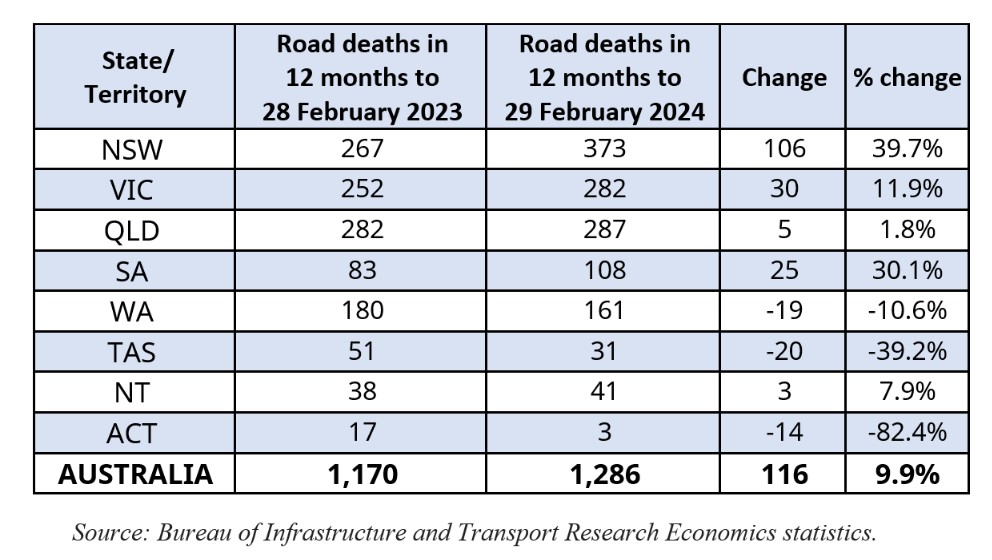Australia’s road toll continues to climb, with 1,286 road deaths in the year to 29 February – up 9.9% on the preceding 12-month period.

New figures show Australia’s road toll continues to climb, with 1,286 deaths on the roads in the year to 29 February – up 9.9 per cent on the preceding 12-month period.
February 2024 was a tragic month for road deaths, with 110 fatalities across the nation – a 25 per cent rise from February 2023.
The 12-month figures include a 39.7 per cent surge in road deaths in NSW, a 30.1 per cent increase in South Australia, and an 11.9 per cent rise in Victoria.
February’s increases follow a major surge in road deaths in the second half of 2023, which saw 681 road deaths recorded – the deadliest consecutive quarters on Australian roads since the first half of 2010.

The nation’s peak motoring body says the numbers underscore the critical importance of the Commonwealth delivering on its election promise to link state provision of road safety data with federal road funding for state projects.
AAA Managing Director Michael Bradley said: “State and territory governments collect the data needed to understand why road deaths are rising, but they are not reporting or sharing this information.
“This critical data covers the quality of Australian roads, the causes of crashes, and the effectiveness of each state’s road rules and enforcement regime. It is crucial for understanding the nation’s road trauma problems and for developing effective responses.
“Data sharing would reveal which state’s road safety measures are the most effective, and the safety interventions that are most needed. That would not only save lives, but also end the politicisation of road funding by revealing whether governments are investing in the roads that most need safety upgrades.”
In the week before the 2022 election, the federal Labor Party committed to: “improve the timeliness and quality of road trauma data and look for opportunities to extract better quality road safety data from states and territories in return for funding of road projects.”
The AAA is calling upon the Federal Government to compel states to publish relevant data via the new National Partnership Agreement on Land Transport Infrastructure Projects which is currently being negotiated with the states and territories. This agreement will dictate how $50 billion in federal road funding is allocated over the five years beyond July 2024.
AAA research shows Australians are deeply cynical about how politicians prioritise road project funding. It also shows that data transparency enjoys overwhelming community support.
Mr Bradley said: “Our polling shows Australians think this a commonsense approach that would not only save lives but also enhance accountability by reducing potential for pork-barrelling.
“Publishing road safety data will enable Australians to see whether politicians spend their money on roads to save lives or to win votes in marginal electorates.’’
Data Saves Lives is supported by the nation’s motoring clubs, and 18 national organisations representing motorists, motorcyclists, truckers, pedestrians, doctors, insurers, road engineers and safety advocates.
The AAA’s proposal has been endorsed by all Liberal, National, Greens and Teals MPs in the House of Representatives. But with only one exception, Labor MPs have so far declined to support road safety data transparency.
For more information on data transparency see datasaveslives.org.au

The Federal Government must explain its continued refusal to implement the road safety reforms it announced just days before the 2022 Election, as new data shows Australia’s road toll continues to climb.
read more
The Queensland Government has agreed to share with the Commonwealth and the public previously secret data about the causes of car crashes, traffic policing and the condition of roads to help tackle the escalating road safety crisis.
read more
The quarterly update of the AAA’s EV Index shows Australians are continuing to shift towards electric vehicles and that internal combustion engines’ market share continues to decline.
read more